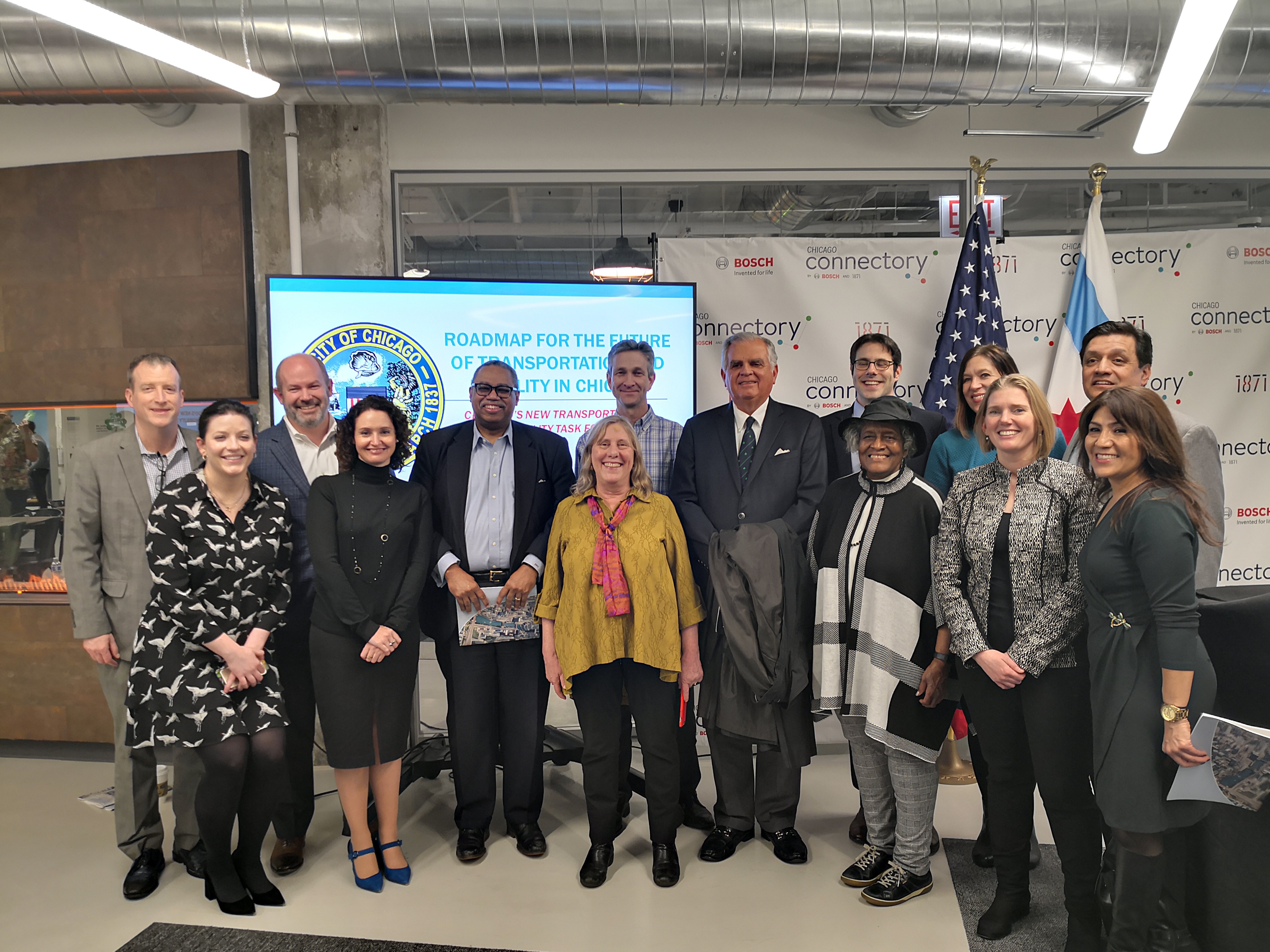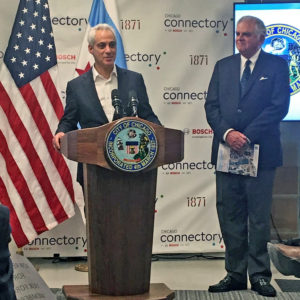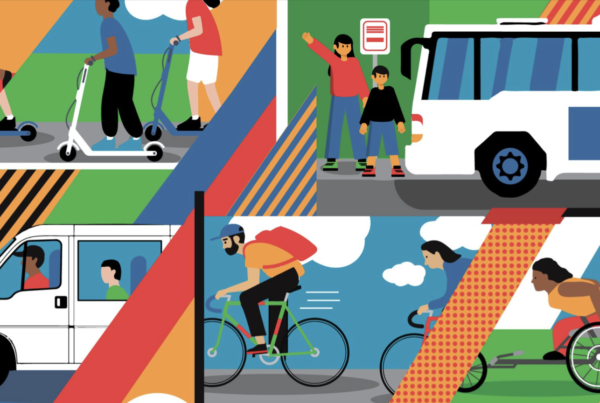Members of Chicago’s New Transportation and Mobility Task Force
On March 14, the Chicago Connectory (the local tech incubator that includes SUMC’s home office) welcomed Mayor Emanuel to present the Roadmap for the Future of Transportation and Mobility in Chicago, a report developed by the New Transportation and Mobility Task Force. Created in September 2018 and chaired by former US Secretary of Transportation LaHood, the Task Force comprises more than 20 experts and thought leaders from the transportation, mobility, and technology sectors, including SUMC Executive Director Sharon Feigon.
In the fast-evolving mobility world, ridership is changing, new service options are appearing and disappearing, and an aging infrastructure is struggling to support new commuting and development patterns. The task force was charged with developing a set of principles to guide the future of Chicago’s transportation system. From these principles came a series of seven overarching objectives supported by 50 actionable recommendations and defined next steps to ensure that the city’s transportation system will provide choices that are safe, equitable, and sustainable to all residents.
The Task Force met monthly from October 2018 – February 2019, addressing the current state of mobility in Chicago (decreasing public transit ridership, the need for a fully accessible mobility network, a rise in lower-capacity, low-efficiency trips among others) as well as how to best integrate new mobility technologies that are changing our transportation landscape.
Seven principles ground present and future mobility developments.
- A transportation system that is safe for all users
- Mobility choices that are accessible, equitable, affordable, and non-discriminatory
- Economic development that is inclusive and innovative
- A city that is efficient, smart and reliable
- Communities that are sustainable, healthy, and built using universal design principles
- Data and information that is actionable, transparent, shared, and secure
- Regulation of private providers that is guided by public benefits
Seven interdependent objectives provide a framework for the recommendations that follow and promote a safe, equitable, accessible, adaptable, and environmentally sustainable multi-modal transportation system in Chicago.
- Streamline governance and management of the transportation system and policies within and across city departments, agencies, and the private sector
- Develop uniform, detailed, and secure data sharing requirements between public and private entities
- Support investments in transportation infrastructure to meet the City’s mobility goals
- Encourage mode shift to right-sized capacity and increased passenger mile efficiency
- Build an accessible, affordable, and convenient multi-modal transportation system
- Advance a transportation and mobility system that promotes environmental health and sustainability and improves overall livability of the city
- Prepare Chicago for connected and automated vehicles
Over 50 actionable recommendations are classified as action items, policy changes, or studies needed, and include:
- Increasing the State of Illinois’ Motor Fuel Tax to fund needed infrastructure improvements and looking at alternatives (such as Vehicle Miles Traveled tax) for future implementation
- Incentivizing businesses to provide public transit benefits to employees
- Determining a governance framework for uniform data sharing
- Investing in critical infrastructure, establishing data sharing requirements, and launching an autonomous vehicle pilot in Chicago
- Ensuring that micro-mobility services and new mobility options are accessible for all and do not impede the public way
- Requiring the City to lead in use of electric vehicles
- Conducting a scooter-sharing pilot in 2019
- Evaluating transportation-related taxes and fees to determine opportunities to restructure the rates to promote reduced reliance on single occupancy vehicles and encourage additional use of high-capacity, high-efficiency options (CTA, pool vehicles, shared vehicles, bikes, etc.)
- Establishing a Chief Mobility Officer to coordinate transportation policy across city departments and sister agencies, lead engagement with mobility providers, and stay abreast of domestic and global initiatives to determine applicability to Chicago
In April 2019, Chicago will be electing a new mayor. This roadmap, which is intended to be workable immediately, details essential next steps to be taken in the next six months. The task force will continue to support the implementation of these recommendations with the new administration and guide future mobility developments in Chicago.
Task Force Members
- Raymond LaHood, Chairman, former Secretary, US Department of Transportation
- Brenna Berman, Executive Director, City Tech Collaborative
- Ron Burke, Executive Director, Active Transportation Alliance
- Dorval Carter, President, Chicago Transit Authority
- Brian Collie, Senior Partner and Managing Director, The Boston Consulting Group (BCG) / Global Leader, Automotive & Mobility Sector
- Rosa Escareno, Commissioner, Chicago Department of Business Affairs and Consumer Protection
- Sharon Feigon, Executive Director, Shared-Use Mobility Center
- Jacky Grimshaw, Vice President,Center for Neighborhood Technology
- Tom Kotarac, Vice President of Transportation and Infrastructure, Civic Committee of the Commercial Club of Chicago
- Rebekah Scheinfeld, Commissioner, Chicago Department of Transportation
- Joseph Szabo, Executive Director, Chicago Metropolitan Agency for Planning
- Karen Tamley, Commissioner, Mayor’s Office for People with Disabilities
- Mike Tomas, Executive Director, Garfield Park Community Council
- Audrey Wennink, Director of Transportation, Metropolitan Planning Council





